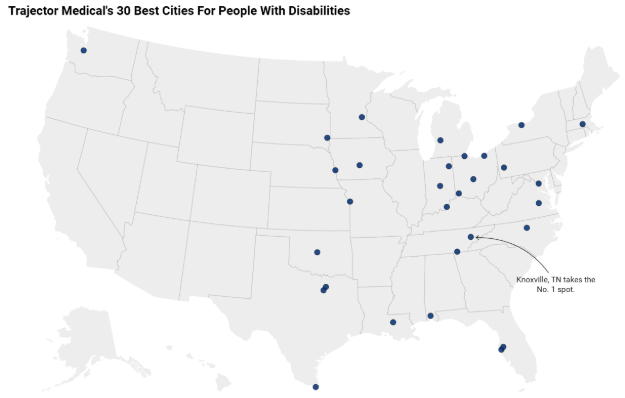July 16, 2025 — Mid-sized, regionally important cities top the rankings of best U.S. cities for people with disabilities, a new study from Trajector Medical reveals, highlighting communities that excel for their accessibility and affordability alongside the availability of healthcare.
The top-ranking cities include:
| Rank | City | State | Relative Score |
| 1 | Knoxville | Tennessee | 100 |
| 2 | Cincinnati | Ohio | 99.12 |
| 3 | Grand Rapids | Michigan | 93.22 |
| 4 | Pittsburgh | Pennsylvania | 88.82 |
| 5 | Mobile | Alabama | 86.27 |
| 6 | Baton Rouge | Louisiana | 84.01 |
| 7 | St. Petersburg | Florida | 83.4 |
| 8 | Fort Wayne | Indiana | 83.14 |
| 9 | Rochester | New York | 81.89 |
| 10 | Worcester | Massachusetts | 81.58 |
| 11 | Chattanooga | Tennessee | 81.03 |
| 12 | Des Moines | Iowa | 77.93 |
| 13 | Brownsville | Texas | 77.51 |
| 14 | Columbus | Ohio | 75.3 |
| 15 | Minneapolis | Minnesota | 75.19 |
| 16 | Irving | Texas | 74.55 |
| 17 | Durham | North Carolina | 73.86 |
| 18 | Washington | District of Columbia | 73.18 |
| 19 | Richmond | Virginia | 73 |
| 20 | Oklahoma City | Oklahoma | 72.81 |
| 21 | Tampa | Florida | 72.45 |
| 22 | Cleveland | Ohio | 70.7 |
| 23 | Tacoma | Washington | 70.27 |
| 24 | Louisville | Kentucky | 70.08 |
| 25 | Sioux Falls | South Dakota | 69.71 |
| 26 | Kansas City | Missouri | 69.32 |
| 27 | Omaha | Nebraska | 68.55 |
| 28 | Plano | Texas | 67.68 |
| 29 | Toledo | Ohio | 67.27 |
| 30 | Indianapolis | Indiana | 66.11 |

U.S. map showing the locations of the 30 best cities for people with disabilities, with Knoxville, TN highlighted as No. 1
Key Takeaways
Knoxville, Tennessee ranks as the best city for people with disabilities. Four Ohio Cities rank among the 30 best cities: Cincinnati (ranked 2), Cleveland (ranked 22), Columbus (ranked 14), and Toledo (ranked 29). Atlanta, Georgia ranks best for accessibility; Toledo, Ohio ranks best for affordability; and Cincinnati, Ohio ranks best for health care.
Why It Matters
Nearly one in seven Americans (13.6%) has a disability, according to the U.S. Census Bureau. However, access to essential services, affordable housing, and employment opportunities varies widely. Trajector Medical’s study highlights this disparity but also underscores the crucial role of inclusive city planning and technology adoption in bridging this gap and supporting Americans with disabilities.
“Our mission has always been to empower people with disabilities who face barriers,” said Paige Polakow, president of Trajector Medical. “This research is another way we’ve fulfilled our promise for more than a decade to improve the life trajectory of those who are underserved or at risk.”
Methodology
Trajector Medical evaluated 141 U.S. cities using 14 metrics across accessibility, affordability, and health care—analyzing nearly 2,000 data points. Example metrics include the percentage of accessible buildings, affordable housing costs, and Medicare-registered hospitals per 100,000 people with disabilities. Data sources included the U.S. Census Bureau, Centers for Medicare & Medicaid Services, Bureau of Labor Statistics, and Zillow.
To access the full rankings and methodology, visit Trajector Medical’s website.
Trajector Medical is a leading provider of medical evidence services for people with disabilities and is based in Gainesville, Florida. Founded in 2014, its licensed medical professionals help individuals gather the medical evidence they need to secure the disability benefits they medically, legally, and ethically qualify for.
Steve Zenofsky, APR, Fellow PRSA
Phone: (352) 363-5312
Email: [email protected]